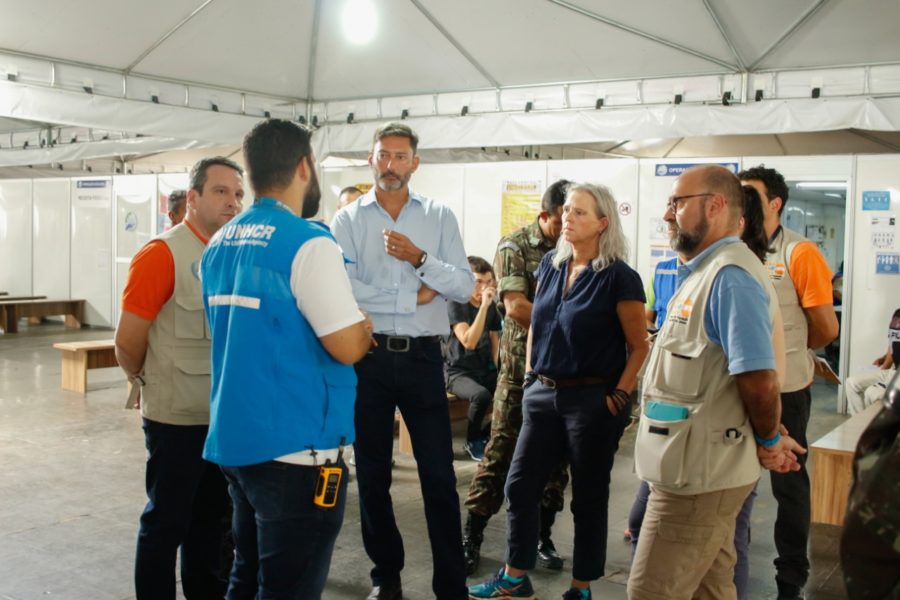Recently, I visited refugee camps on the Brazil-Venezuela border, talking to those who have escaped Venezuela. The main crossing point is a small Brazilian town called Pacaraima, at the very northern-most tip of the country, in the smallest, poorest Brazilian state of Roraima. A city of 12,000 inhabitants receives between 500 to 1,000 migrants a day. This has been going on for two years, and the number is growing.
Local public services are alarmingly loaded, such as the health sector. In some Venezuelan indigenous groups crossing, 10% have HIV/AIDS. Around 80% of births in the local hospital are to Venezuelan women. Why? Because they tell horror stories of medicine running out across Venezuela. Pregnant women prefer to make a journey of hundreds of miles, rather than risk giving birth in Venezuela. HIV positive individuals have to flee to get the drugs they need. Cancer drugs have run out in Venezuela – so the Brazilians have seen a huge increase in the number of cancer sufferers coming across.
It’s not just health. Many are fleeing violence from regime militias and the military linked companies operating in indigenous lands. Others are trying to find their families, who have already fled from the brutal Maduro regime and its self-inflicted humanitarian crisis.
It was inspiring, however, to see the Brazilian and international response. The Brazilian Army is leading Operação Acolhida (Operation Welcome) – which shelters all those coming across the border, from any country. They provide food, clothes, medical care and vaccinations, and have brought a very Brazilian approach: their warmth with the Venezuelan migrants is heart-warming, especially with the children, who are now 50% of those crossing the border. The extensive peacekeeping experience of Brazil is clearly shown through their support, with field hospitals and temporary shelters. And even more, in the way they work with the UN. An alphabet soup of UN and other agencies (UNFPA, UNHCR, ICRC, IOM) are fully integrated into the Brazilian operation. I was there with the representative of UNFPA and was able to see all of this, first-hand.
Together, the agencies explain to migrants the choices available, help them get the right papers, work towards the distribution of migrants into wider Brazil, try to offer them new lives, and relieve the burden on Roraima. They do an amazing job on each one of these fronts. This is a major migration and there is an enormous amount of suffering – but it is no crisis. Yet, I worry, as do many in the area, about how much worse it could so easily get, as conditions worsen in Venezuela. Contingency plans are in place, but if the situation continues to develop at its current speeding pace, it will be tough to contain a crisis. Some of the inspiring local community and faith leaders – helping feed the migrants, and looking after the children – feel it is already at breaking point.
So international support, already significant, will be even more necessary. The UK is now providing £14.5m to support those affected by the crisis in Venezuela and the region through aid from the Department for International Development, supporting the UN system and other international organisations in Brazil, as well as Colombia and other neighbouring countries in their crisis response. Of this, £1m of UK aid has been provided to the International Federation of the Red Cross for their regional population movement appeal, and the UK has funded short-term experts to work in UNICEF and UNHCR in Roraima where they are needed most. This is in addition to the UK’s core funding to the UN and Red Cross Movement, and contributes to reaching 3.6m people across the region.
We are also working diplomatically, including with President Bolsonaro’s government, to try to ensure an end to the humanitarian crisis driving people out of Venezuela. That clearly needs the Maduro regime to give way to free and fair Presidential elections. And support for the reconstruction of Venezuela, from neighbours and international friends. Then, finally, the Venezuelans can go home, as they want. A Venezuelan boy, Ottoniel, was singing a song he had written as we passed through, called “Venezuela”. He was amazing. And it was clear where he wanted to be.

